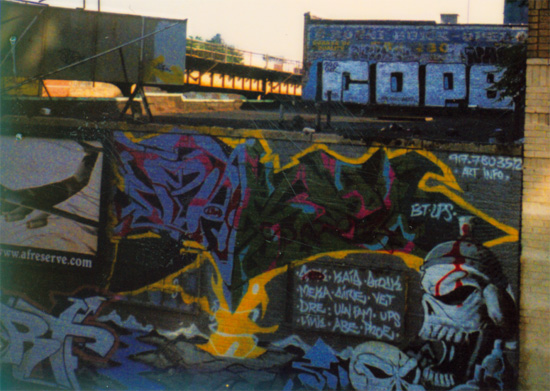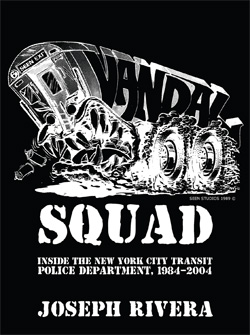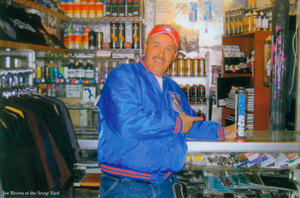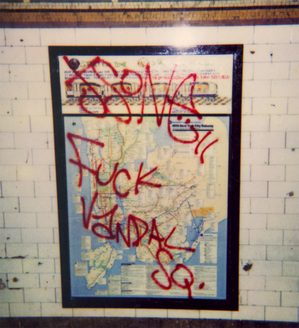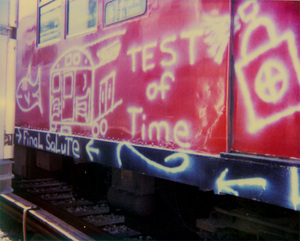This is an archive of the ArtCat Zine, 2007-2009. Please visit our new project, IDIOM.
Re:Public: A Review of VANDAL SQUAD & An Interview with Author Joseph Rivera
Judging by the thousands of books that have emerged over the years about graffiti you'd be forgiven for forgetting that it's an art form that thrives on its illegality, but with the recent release of Vandal Squad by powerHouse books that me be about to change. Former NYPD Vandal Squad cop Joseph Rivera has written a biography of sorts about his twenty years on the force (1984-2004) through the eyes of a native who chose to enforce the law against these artistic rebels. It's not your typical graffiti book but then Rivera isn't your typical author either.
Rivera's story begins with his admission that as a kid he would watch the trains go by decked out in graffiti and in the eighth grade he "caught my first and only tag on a city bus that ran on Tremont Avenue." It was a period when "materpieces, blockbusters and throw-ups totally covered the outside of the trains, and marker tags filled the inside of the cars." He admits that he "would look upon some of those pieces with awe" but he ended up in the Transit Squad in 1984 since he thought "this sure beats working at the deli."
His prose is simple but comes across as authentic and honest. He doesn't glorify the Vandal Squad but he has a deep respect for a police force that didn't always return the favor. First serving as a cop in the Transit Service and then as an officer in a unified NYPD, Rivera was perpetually overlooked for promotions. He suggests possible explanations for this but we are left feeling that the real reason may have ultimately eluded him.
During his 20 year journey as a Vandal Squad cop he meets characters of all types, including cops he clicked with and others he didn't. He writes about graffiti writers who stopped because of the threat of criminal prosecution and others who continued no matter the consequences. Some of the stories are interesting windows into the lives of these urban artists but others meander and would've benefited from careful editing.
But even among his laundry list of war stories, which includes run ins with everyone from the KGKASS Crew to the YKK Crew and most famously REVS, there are passing thoughts that give us insight into the essence of graffiti. When Rivera "collared" graffiti pioneer STAY HIGH 149 he discovered that the artist -- the author calls them vandals -- was a gentleman. "He gave us no problems whatsoever," Rivera writes. "He told us, 'I beat the drugs but I can't beat graffiti.'"
While the book is packed with illustrations, the quality of the image are not comparable to other books in the genre--though there are some gems by photographers Martha Cooper and Jamel Shabazz included in the mix. Yet in some ways these grainy images with awkward framing dovetail nicely with the author's tone, which prefers factual accounts over narrative finesse.
Vandal Squad has received tons of negative press in the online graffiti world (1 , 2 , 3 , 4...) and some commenter have attacked Rivera's book as an opportunistic way to profit from other people's pain. But the book was a surprise to me and, in my opinion, successfully humanizes police officers who--for the most part--are simply enforcing laws made by elected politicians. It also noteworthy that the book has also been trumpeted by graffiti writer, COPE2 , who believes he's vindicated by the book for an incident that branded him a rat many years ago. Unfortunately, COPE2, like some other graffiti writers, remain a breathtakingly ignorant bunch of homophobes... but that's another story for another time.
After I finished reading his book I couldn't resist reaching out to Rivera to ask some questions. At Rivera's request, the interview was conducted via email.
HV: One of the things I found most surprising about your book was that you seemed to have a level of appreciation for graffiti. Can you tell me a little about that? Was it a tough thing for you to see people who were obviously talented but perhaps misguided about how to use their talent?
Joseph Rivera: Yes, there was in fact admiration, however it was strictly for some of their talent. Some vandals have such real talent which at times they use in a manner which would be acceptable. Such as producing a mural on a PERMISSION wall, note the key word. Sometimes they even produce canvas's which are displayed in galleries which is also acceptable.
HV: Why did you feel you had to write this book?
JR: There have been an over abundance of books, magazine's, video's that depict graffiti vandalism from the eye of others, such as vandals themselves. I wanted to create a book that would take the reader inside the elite unit I worked for discussing many events pertaining to graffiti and also the internal situations that were faced on a daily basis. I wanted the reader to see graffiti/vandalism from the eyes of the individuals who pursue these vandals and give an idea what it would be like to be a victim of these senseless crimes.
HV: I noticed you talk extensively about graffiti in the book but you don't discuss street artists like Keith Haring or Shepard Fairey, who didn't necessarily bomb whole neighborhoods but were doing their form of graffiti nonetheless. Was there a distinction in the Vandal Squad between graff and street art? Did you guys know or care if there was a difference?
JR: Being assigned to the Transit Vandal Squad our main objective was to eliminate graffiti/vandalism in the NYC subway system, that's not to say that if a member of the Transit Vandal Squad was traveling in the street they would pass up an opportunity to apprehend a vandal in action in the street. The way I treated street vandalism was, if a vandal can tag up in the street, then he can certainly cause damage in the subway.
HV: I got the sense that a level of your consciousness was obsessed with graffiti as much as the kids or adults creating it on the trains and on the streets, why do you think that is?
JR: Like anything else in life the more your involved with something it becomes a part of your life. Chasing these vandals became a very large part of my life, so I became very good at it.
HV: The graffiti community has really come down hard on your book and many people are refusing to buy it, did you expect that or did you think graffiti writers were ready to hear your side of the story? Has there been any reaction (for better or worse) from your fellow cops?
JR: Graffiti vandals are afraid to admit there are other stories to be told besides their war stories. I guess they feel they have to distance themselves from any law-enforcement figures. I assume they want to save face with their peers! I recently heard that a graffiti vandal was arrested for spray painting and what do you think was in his bag! Yes, a copy of Vandal Squad!
The individuals I use to work with actually have given nothing but positive feedback, they actually enjoyed the stories and it brought them back in time seeing the trains with so much damage. The whole experience has been nothing short of great!
HV: Who are the graffiti writers you respect the most and why?
JR: There are many graffiti vandals that are extremely talented, such as Seen, Cope, Ces, Stem, Ewok just to name a few. Certain vandals conduct themselves as professionals for example: They get bagged for graffiti related crimes and they simply take their lumps accordingly, they act like adults. They realize they are out there and at anytime they can get nabbed, they play the Cat and Mouse game very well. The younger graffiti vandals are prone to give law-enforcement officials the bulk of the problems.
HV: If you could change the graffiti laws in the city, how would they be different?
JR: I don't think changing the laws for graffiti related crimes is the answer, I think that after these vandals are nabbed and charged by the Police Department the court has to step up their efforts and stop letting these vandals walk out with a slap on the wrist. When warranted a vandal should be charged with a felony and the court should seek the maximum penalty, not let the vandal plea the charge down. In regards to street graffiti, if graffiti is allowed to stay on property it becomes a "billboard" thus becoming advertisement for these vandals. There are many programs that are available for store owners and homeowners to seek assistance in cleaning up damaged property. These programs are funded by the NY State. The problem in NYC is that there are to many absentee owners who are just worried about collecting their rent/monies due, they don't care about the appearance of the property they don't live in. Lets start holding them responsible for cleaning up their property. If they don't clean it up in a timely fashion, give them a summons. It works in other towns!
HV: How would you respond to those who think New York's graffiti laws are too strict and should be revisited?
JR: There are no laws that are too strict, they range from Violations to Felonies. I think that when a graffiti vandal decides he is going to break the law, then he should suffer the consequences. After all he knowingly violates the law and also causes innocent victim's to suffer. These victims will have to dish out "outer pocket" expenses just to simply clean up the damage caused by these poor misguided individuals. That's why the court system has to go after these individuals and not let them just walk through the "revolving door." Make them pay for the damage, garnish their checks, if and when they get one. If their under age go after the parents, let them pay for the damage their little darlings cause.
HV: In your book you write about your frustration with the police department that refused to promote you. I found it to be the most poignant part of your book. Can you explain how that impacted your police work?
JR: The entire process was totally unfair, to say the least. In the 80's the Transit Vandal Squad was Incorporated in what was called the "Career Path Program". This meant that officers assigned to these specialized units would commit themselves and stay for 54 months, this commitment would earn them a Detective Shield. The Transit Vandal Squad was Incorporated by then Police Chief William Bratton. With this in place many officers like myself decided to stay in the Transit Vandal Squad and fulfill our commitment to the department. In 1995 the year of the dreaded merger, many officers were given the royal shaft, so to speak. I myself was 21 days away from receiving what was promised to me by the department. Being that the NYPD and Housing Police departments didn't have a career path unit that mirrored what our unit did, we were simply denied the promotion to detective, a promotion that was certainly earned. The Police Commissioner at the time was William Bratton, so I was really surprised that this actually happened to us. I figured after all he was the one who Incorporated us into the Career Path to begin with, well that just goes to show what politics are all about! This definitely effected the members of the Transit Vandal Squad, some members actually closed down while others like myself continued to work to get what was due to us, unfortunately It never happened! Even though I was wronged, I always performed well above average and worked that much harder becoming an expert in the field of graffiti within the police department.
HV: I also got a sense that your job was a very lonely one without a lot of support from the higher ups, is that true?
JR: The job itself was great, the guys I worked with were the best, even though we disagreed on several things it was still a great job. The support I received internally was terrific this include my co-workers and bosses (Lt. and Sgt's). Any rank above that was all political, they came out when a great arrest was made seeking glory off the backs of hard workers. Then they disappeared, when ever an incident occurred, the higher ups were only concerned with securing their positions. That's what made the job shitty at times, this also made it very frustrating to perform at a higher level. I sometimes second guess myself for not becoming a "pail of shit" within the police department, just sitting back collecting a check.
HV: Out of curiosity, do you have any graffiti displayed in your home? Or photos of graffiti?
JR: If I tell you that I might get "Raided"!
HV: How would you characterize the change in your job from the early years till you retired from the force?
JR: When I became a cop in the 80's you always respected the old timers assigned to your commands, after all they worked for what they had. I'll never forget when I was in my 19 year, I was standing in front of the Station House Desk with a prisoner and I overheard a young cop complaining how an old timer was assigned to a Squad Car. Well I simply looked over at the rookie and told him to "Fuck Off" and then I called him an "Unappreciative Little Prick"...after all the old timers laid the ground work for that rookie bastard. He just walked away mumbling to himself, that's how the job changed, no respect!
*******************
Vandal Squad is available via Amazon & powerHouse books . You can view the video book trailer here .
All images reproduced with permission from powerHouse books
Also of interest is an event on Thursday, March 19 (7–9pm) at the powerHouse Arena (37 Main Street, Brooklyn). powerHouse will host a first-ever conversation between former members of the Vandal Squad and graffiti writers. Panelists include Vandal Squad author Joseph Rivera, former Commanding Officer Lieutenant Steven Mona, original Vandal Squad Lieutenant Ken Chiulli, graffiti legend COPE2, graffiti activist Ket, and street artist ELLIS G. The event will be moderated by cultural consigliere Sacha Jenkins SHR.
ZINE
HOME
TIPS / COMMENTS
CATEGORIES
CONTRIBUTORS
- Greg Afinogenov
- B. Blagojevic
- Adda Birnir
- Susannah Edelbaum
- Julie Fishkin
- Paddy Johnson
- Jessica Loudis
- Christopher Reiger
- Andrew Robinson
- Peter J. Russo
- Blythe Sheldon
- S.C.Squibb
- Hrag Vartanian

